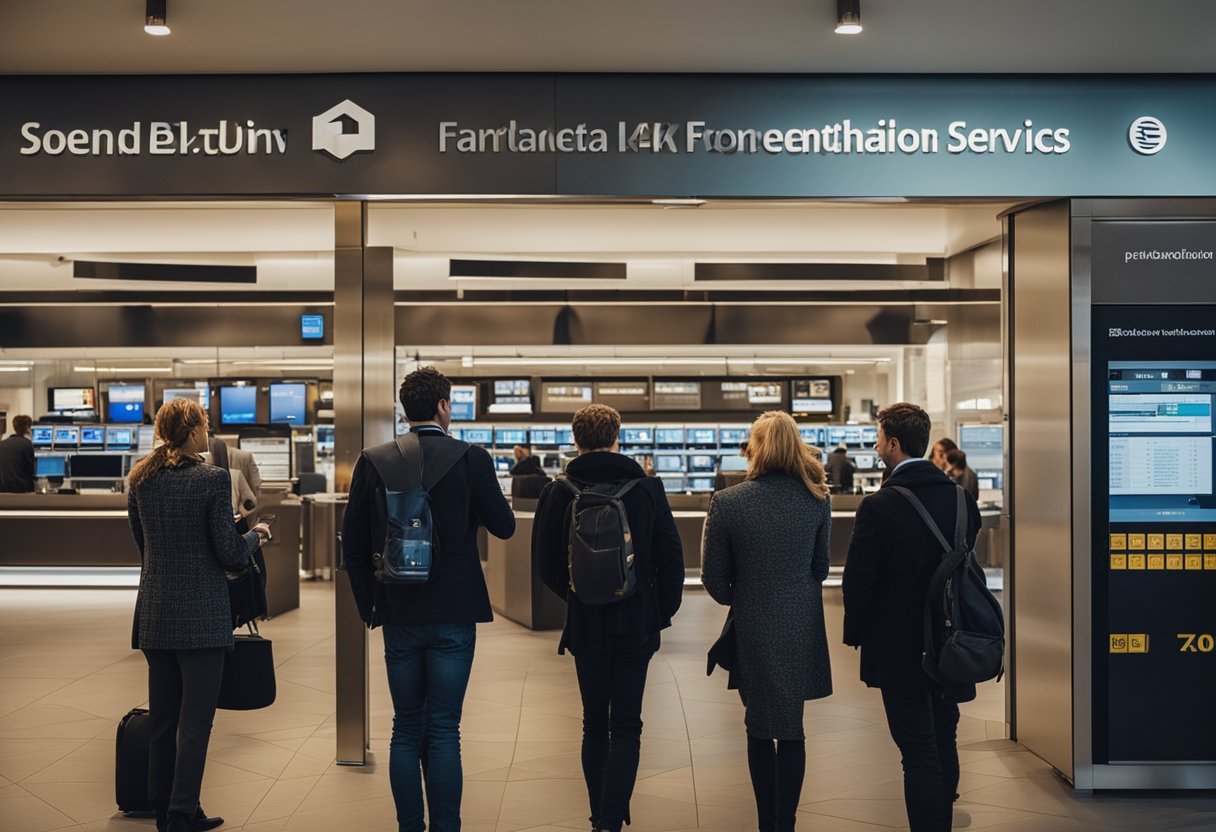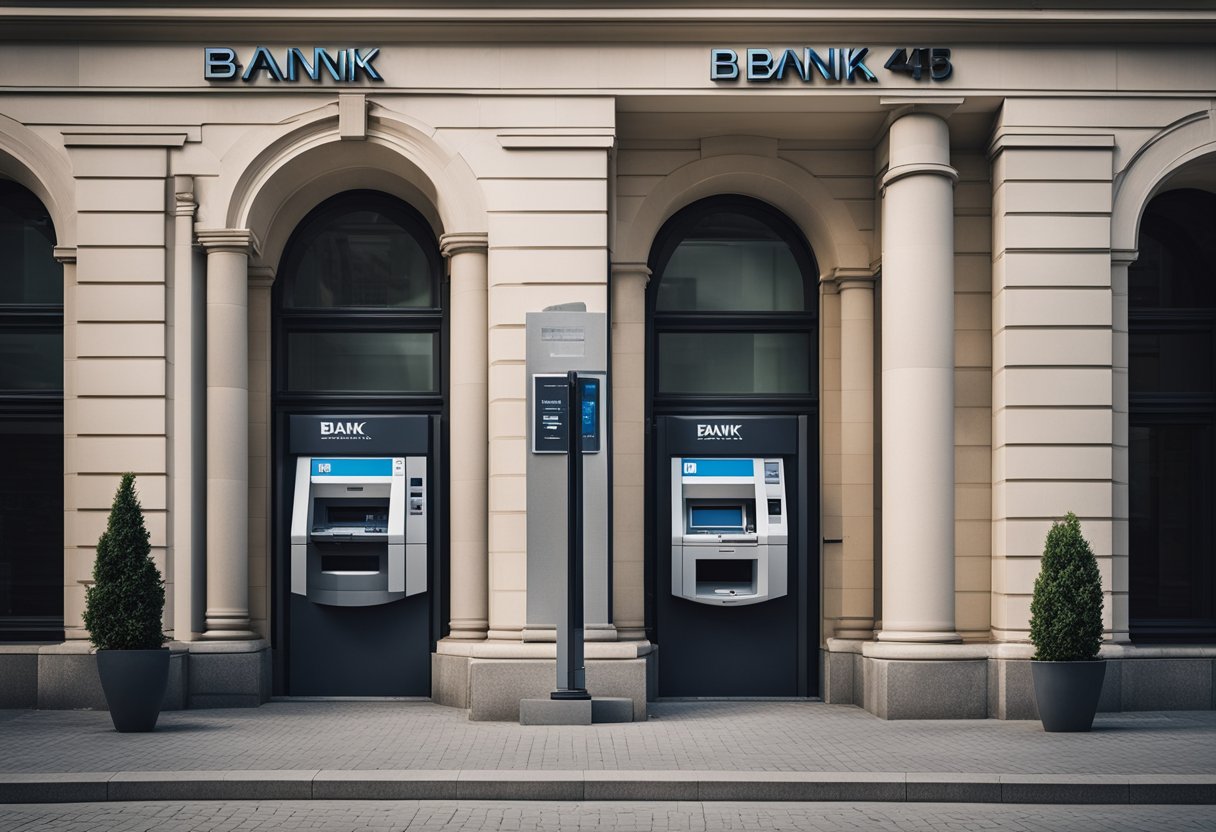Berlin, the vibrant capital of Germany, hosts a diverse banking sector that caters to its cosmopolitan populace and numerous expatriates. The Banks in Berlin range from traditional financial giants to modern online banking platforms, each providing a variety of services suited to different customer needs.
While you won’t find a Bank of America or Citibank branch here, Berlin’s banking scene is dominated by major German and international institutions, ensuring comprehensive banking services are widely accessible.
Among the prominent names, the largest bank in Berlin, Deutsche Bank, stands out for its extensive presence and array of financial services. Banks like Berliner Sparkasse and Commerzbank also hold significant clout in the city, offering residents everything from basic account management to complex investment products.
For those seeking the convenience of digital banking, N26, a Berlin-based bank, provides an entirely online banking experience with English-speaking customer support.
Foreign banks, including some U.S.-based ones like J.P. Morgan Chase, operate in the city, but typically cater to corporate or investment banking clients rather than offering retail services.
This landscape ensures that both long-time residents and newcomers can navigate Berlin’s banking system with relative ease, supported by a network of both online and physical branches throughout the city.
Overview of German Banking System
The German banking system is characterized by its three-pillar structure consisting of a variety of institutions, each playing a significant role in the financial landscape. It is marked by a robust regulatory environment ensuring stability and security.
Types of Banks in Berlin
Germany’s banking system is differentiated into several distinct categories. Public banks include the savings banks (Sparkassen) and Landesbanken, which are regional banks acting as central institutions for the savings banks within their region.
Co-operative banks, such as the Volksbanken and Raiffeisenbanken, serve their members’ interests and work closely within local communities. Moreover, private commercial banks compete in the market with a focus on profitability, with Deutsche Bank often being recognized as one of the largest.
Additionally, the country hosts international banks, but major foreign entities like Bank of America or Chase Bank do not have branch locations in Berlin.
Regulatory Framework
The German banking sector operates under a stringent regulatory framework, spearheaded by the Deutsche Bundesbank and the Federal Financial Supervisory Authority (Bundesanstalt für Finanzdienstleistungsaufsicht or BaFin).
These regulatory bodies enforce strict policies and guidelines to uphold the stability and integrity of the financial system. Within this framework, banks are expected to adhere to both national and international regulatory standards, ensuring that they are well-equipped to mitigate risks and protect their customers’ interests.
Opening a Bank Account in Germany
Opening a German bank account is a fundamental step for anyone planning to live, work, or study in Germany. It’s essential for managing finances, such as receiving a salary, paying rent, or handling day-to-day transactions.
Documentation Required
Proof of Identity: A valid passport or national ID card is mandatory for the sign-up process. Non-EU citizens may also need to present a valid visa and residence permit.
Address Registration: A registered address in Germany, confirmed by a proof of address document such as an Anmeldebestätigung (registration certificate), is typically required.
GERMAN IBAN: Upon opening an account, customers receive a German IBAN (International Bank Account Number) necessary for domestic and international financial transactions.
Choosing the Right Banks in Berlin
For students, expats, and non-German speakers, selecting a bank that caters to their specific needs is crucial. Many banks in Berlin offer services in English and customer support for those still navigating the German banking system.
- Expat-Friendly & English Services: Some German banks, such as Commerzbank, offer basic online banking in English, making it accessible for non-German speakers.
- Physical Presence: While banks like Deutsche Bank are known for their widespread presence and the ability to cater to expats’ needs, others may offer a fully digital sign-up experience without requiring an in-person visit.
- Major Banks: Institutions like Berliner Sparkasse are among the largest banks in Berlin and provide a variety of services that may be aligned with customer needs, from basic accounts to more comprehensive banking packages.
Popular Banks in Berlin
Berlin’s banking landscape combines traditional institutions known for their comprehensive service and modern online banks that offer convenience and innovation. Residents can access a wide range of financial services tailored to their needs.
Traditional Banks in Berlin
Commerzbank and Deutsche Bank are among the most established banks in the capital, offering a broad array of products, from basic checking accounts to complex investment services. Commerzbank provides services in both English and German, making it accessible for expatriates.
Deutsche Bank, as one of the biggest banks in the city, offers extensive customer support in English. Customers also frequently utilize services from Sparkasse, particularly Berliner Sparkasse, which is deeply integrated into the local financial fabric.
- Landesbank Baden-Württemberg and Landesbank Hessen-Thüringen play a crucial role in the region’s economic support.
- Volksbank and Postbank are also prominent, with a strong presence in Berlin, offering customers regional and national services.
- HypoVereinsbank, part of the UniCredit group, delivers a wide range of banking services and is a member of the Cash Group, providing cost-free cash withdrawals at their ATMs across the city.
Online and Mobile Banks
On the digital front, banks like N26 and Comdirect lead in terms of mobile banking solutions, with N26 known for its user-friendly app and innovative banking experience. ING, formerly known as ING-DiBa, offers competitive online services and has established itself as a strong choice for savvy online customers.
- N26 caters especially well to an international clientele with its straightforward English online banking platform.
- ING is appreciated for its no-fee account management and attractive terms for savings and loan products.
While certain international banks like Bank of America or Citibank do not have a retail presence in Berlin, the local branches of global banks generally focus on corporate or investment banking rather than offering retail services to the public.
Residents and expats alike will find that the city’s banks cater to a full range of financial needs, with each institution striving to offer both convenience and reliability.
Financial Services for Expats and Foreigners
Berlin offers a range of financial services tailored specifically for expatriates and foreigners, with several banks providing English-speaking support and international banking solutions. Accessibility to multi-currency accounts and efficient international transfers is an essential aspect of banking for expats.
Expat-Friendly Banks in Berlin
Commerzbank and Berliner Sparkasse are among the expat-friendly banks in Berlin, offering a gamut of services in English. They help expatriates navigate through the process of setting up a bank account with less hassle. Expats may also consider online banks like N26 and DKB, which provide English interfaces and support.
International banks, such as Deutsche Bank, have a presence in Berlin and offer services with expatriates in mind, including the possibility of opening a sperrkonto or block account, which is particularly useful for those who are in Germany for study or job purposes.
Foreign Currency and International Services
Expatriates often need to manage finances across borders, and banks like Revolut, TransferWise (now known as Wise), and bunq offer multi-currency accounts and competitive rates for international transfers, which can be a cost-effective alternative to traditional banks.
International transfers are smooth with these digital banking platforms, ensuring that expatriates can easily move funds between countries. Additionally, they cater to frequent travelers and workers who manage currencies other than euros by providing convenient currency exchange services.
Banking Features and Products
When exploring the banking landscape in Berlin, customers can find a variety of features and products tailored to their financial needs, from traditional offerings such as checking and savings accounts to modern solutions like online banking and comprehensive loan services.
Checking and Savings Accounts
Banks in Berlin offer a range of checking (Girokonto) and savings accounts suited to different customer profiles. Checking accounts often accompany a debit card and the convenience of direct salary deposit, while savings accounts are designed to help customers accrue interest on their savings.
Credit and Debit Cards
Credit and debit card options are widely available. Most German banks provide customers with a debit card when opening a checking account, and credit cards usually come with various benefits and interest rates. Cautious spending and timely repayments are crucial to avoid high overdraft interests.
Online Banking and Apps
Digital banking has revolutionized how customers interact with their finances. Nearly every institution offers online banking services, and many have developed dedicated mobile banking apps to manage finances on-the-go. These platforms typically include real-time transaction tracking, bill payments, and financial planning tools.
Loans and Financing Services
Loans and financing services cater to both personal and business clients. Banks in Berlin assist with a range of borrowing needs, from personal loans and mortgages to business financing. Applicants should compare offers to find the best terms and rates.
Banking Costs and Fees
When opening a bank account in Berlin, a variety of banking costs and fees can apply, ranging from monthly maintenance to ATM withdrawal charges. Potential customers should be informed about hidden fees and exchange rates that can affect their overall banking experience.
Understanding Various Charges
Most banks in Berlin charge a monthly fee for the maintenance of your account, which can vary depending on the bank and the type of account you have. These fees are typically a fixed euro amount and are directly debited from your account. For example, some banks offer accounts with no monthly fees, while others may charge up to 20 euros per month.
ATM fees are another charge to be aware of. While many banks offer free withdrawals at their own ATMs, there can be fees for using ATMs from other banks. Moreover, when it comes to making deposits, some banks might charge a fee, although this is less common.
When using your card internationally or for online purchases in a foreign currency, an exchange rate fee is typically applied. Customers must review the bank’s policy on foreign transactions to avoid unexpected charges.
Avoiding Extra Costs
To avoid extra fees, customers should look for banks that offer a flat rate for monthly fees inclusive of various services, such as free ATM use, online banking, and international payments. Banks might have promotional periods or packages for different customer segments like students, where the monthly fee is waived.
Additionally, be assertive and inquire about any hidden fees to ensure transparency. Some accounts may have stipulations about minimum deposits or a required minimum balance to avoid additional charges.
For individuals dealing with multiple currencies, it’s beneficial to understand and compare the exchange rates provided by different banks. Banks with more favorable rates can offer substantial savings over time, especially for frequent travelers or expats.
Choosing a bank in Berlin requires careful consideration of these fees to manage one’s finances effectively. Each bank will have its own fee structure, so comparing offers is essential in finding the right fit for your banking needs.
Money Handling and Transfers
In Berlin, Germany, the banking infrastructure is well-developed, offering a wide range of services for both cash management and digital transactions. Customers can seamlessly perform ATM withdrawals and engage in both domestic and international money transfers, including SEPA transfers.
ATM Network and Cash Withdrawals
Berlin is home to an extensive ATM network where customers can withdraw cash using their Girocard, Visa, or other major bank cards. Many banks in Berlin are part of the Cash Group, a coalition allowing free withdrawals among member banks. ATMs are ubiquitous in the city, making it convenient to access cash at any time.
- Girocard: Widely accepted for cash withdrawals.
- Visa: Offers extensive global ATM access.
- Cash Group: Allows free withdrawals among member banks.
Domestic and International Transfer Services
For money transfers, German banks provide efficient services including domestic and international transfers. SEPA transfers are commonly used for transactions within the European Union, ensuring quick and low-cost transfers.
- Domestic Transfers: Typically processed through Girokonto accounts.
- International Transfer Services: Include various online services and banks.
- SEPA Transfers: Offer a standardized method for transferring funds across EU member states.
Customer Support and Services
In Berlin, Germany, bank clients enjoy a variety of customer support options, catering to both local and international account holders. Many banks provide multilingual customer service, which is a vital feature for expatriates and English-speaking residents.
Telephone Support
Most institutions offer telephone support for general inquiries:
- Deutsche Bank operates an English-speaking customer service, available at +49(69)910-10000 from Monday to Friday, 8 am to 8 pm. They also maintain a dedicated hotline for international students at +49(69)910-10006. (Deutsche Bank Service & Contact)
- Berliner Sparkasse can be reached via telephone at 030 869 869 69 for assistance. (Berliner Sparkasse Contact)
- Commerzbank offers customer support through their phone and email support services, available 24/7 at +49 (0)69 / 50 50 27 86. (Commerzbank Phone and Email Support)
Online Services
Online banks have risen in popularity in Berlin, providing digital platforms for customers to manage their accounts efficiently. Monese, for example, speaks 14 languages, accommodating a variety of customers. (All About Berlin)
| Bank Name | Online Banking | Multilingual Support |
|---|---|---|
| Deutsche Bank | Yes | Yes |
| Berliner Sparkasse | Yes | Yes |
| Commerzbank | Yes | Yes |
| Monese | Yes | Yes (14 languages) |
As for the presence of foreign banks like Bank of America or Chase Bank, they do not have physical branches in Berlin, Germany. ING Group does operate through its subsidiary, ING-DiBa, offering services tailored to the German market.
The largest bank in the context of the number of branches in Berlin is Deutsche Bank. Being a major financial hub, the city hosts various other local and international banks, providing comprehensive services and support to meet the needs of their diverse clientele.
Banking Tips and Best Practices
When navigating the banking scene in Berlin, expatriates have a range of choices to ensure their financial affairs are in order. Below are some of the key tips and best practices for choosing the right bank and managing a bank account effectively in Berlin.
Choice and Account Types: It is essential for expats to review the different types of banking institutions available, from traditional branches to modern online banking platforms. The largest bank in Berlin, as well as in Germany, is Deutsche Bank, which offers a comprehensive range of services including savings accounts, checking accounts, and credit cards.
| Bank Type | Pros | Cons |
|---|---|---|
| Traditional | Full-service, In-person help | Potentially higher fees |
| Online | Lower fees, Convenient access | Limited personal interaction |
Savings and Cash Management: They should consider setting up a German bank account tailored to expats. These accounts often come with English-speaking customer service, which is a significant advantage for those who may not yet be fluent in German.
Online Banking: For tech-savvy individuals, the convenience of online banking with institutions like N26 is a significant draw. Customers of such banks enjoy streamlined processes for savings and everyday transactions.
Withdrawals: Expatriates might want to note that while banks like Bank of America or Citibank do not have branches in Berlin, their partnership with local banks allows for easy cash withdrawals.
Credit Cards and Cash: It’s common in Berlin to use cash for transactions, however, having a credit card for larger purchases or unexpected expenses can be a safety net.
Foreigner Friendly: Newcomers to the city might opt for banks known for being foreigner-friendly, offering services such as English language support and assistance with setting up an account before arriving in Germany.
By considering their banking needs, seeking savings opportunities, and understanding the local banking landscape, expatriates can manage their finances smoothly while living in Berlin.
Conclusion
In the landscape of banking within Berlin, expatriates and residents have a wealth of options to consider. Institutions range from large domestic banks known for comprehensive services to smaller, agile online banks that offer user-friendly digital experiences. Deutsche Bank, for instance, stands out as the largest bank in the city, providing extensive branch networks and financial products suited to a spectrum of clients.
While Bank of America and Chase Bank do not have branches in Berlin, global individuals often turn to international banks like Deutsche Bank for their versatile offerings. Those looking for a connection to American banking entities may not find direct branches but can avail of the services of banks with international partnerships or correspondent banks that facilitate overseas transactions.
For clients prioritizing English-language services, certain banks like Commerzbank have received commendations for their customer support and partial website translations in English, enhancing accessibility for non-German speakers.
With the absence of Citibank in Germany after selling its retail operations in 2015, customers often explore local alternatives that provide similar global banking services.
Berlin’s banking sector is distinguished by its variety, from traditional Sparkassen to cooperative banks (Genossenschaftsbanken), each catering to different customer needs with their unique propositions. Clients are encouraged to scrutinize the pros and cons of each to determine the most suitable financial partner in Germany’s vibrant capital.
Frequently Asked Questions
This section addresses common inquiries related to banking services in Berlin, Germany, for expatriates, international students, and US citizens.
Which banks are considered the best for foreigners residing in Germany?
For expatriates living in Germany, banks that offer English-speaking services and support for international transactions are highly valued. All About Berlin provides insights into choosing the best German bank based on one’s needs.
How do international students open a bank account in Germany?
International students typically require a passport and student registration to open a bank account in Germany. The process may vary, but resources such as the Berlin School of Business and Innovation guide students through it.
What are the most recommended banks in Berlin for everyday banking?
Recommendations for everyday banking in Berlin often include banks that provide convenient ATM access, online banking services, and customer support. Nomaden Berlin reviews the most popular options.
Can United States citizens access US banking services while in Germany?
US citizens can maintain access to their US banking services while in Germany, but they should verify international fees and branch availability. While banks like Bank of America or Chase may not have branches in Berlin, they often have partner banks where customers can withdraw cash without extra charges.
What are the characteristics of a top-ranked bank in Berlin?
Top banks in Berlin are typically characterized by their comprehensive financial services, multilingual support staff, robust online banking platforms, and favorable customer reviews.
Are there any major banks in Berlin that are prominent internationally?
Berlin is home to major banks with significant international presence, known for their reliability and wide range of services for both personal and business banking needs.





